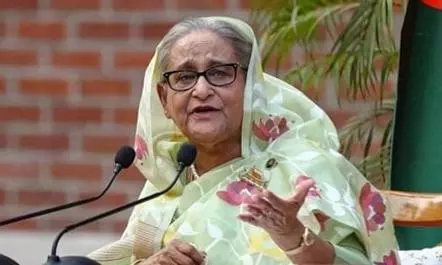
Bangladesh warns media against reporting Sheikh Hasina’s statements
Interim government cites national security as reason for ban after convicted, fugitive former PM was sentenced to death in absentia for ‘crimes against humanity’

The interim government in Bangladesh has warned all print, electronic, and online media outlets to refrain from reporting statements issued by “convicted and fugitive” former prime minister Sheikh Hasina, citing concerns over national security and public order.
Hasina, 78, was on Monday (November 17) sentenced to death in absentia by Bangladesh’s International Crimes Tribunal (ICT) for “crimes against humanity” over her government's brutal crackdown on student-led protests last year.
The ICT also handed the death sentence to former home minister Asaduzzaman Khan Kamal on similar charges.
Matter of ‘national security’
The National Cyber Security Agency (NCSA) of Bangladesh, in a press release issued on Monday, claimed that Hasina’s statements may contain directives or calls capable of inciting “violence, disorder and criminal activities” and disrupting social harmony, The Daily Star newspaper reported.
Also read: Hasina’s death sentence pushes Bangladesh to brink of civil war
“We urge the media to act responsibly in the interest of national security,” the release said.
The agency said it was “deeply concerned” that some media organisations were broadcasting and publishing remarks attributed to the “convicted” and “fugitive” Hasina.
Media houses reminded of ‘legal obligations’
Noting that airing or publishing statements from individuals who are both convicted and fugitive violates provisions of the Cyber Security Ordinance, the agency warned that authorities are empowered to “remove or block content that threatens national integrity, security or public order, promotes ethnic or religious hatred, or directly incites violence”.
It further said that using a false identity or illegally accessing systems to spread hate speech, ethnic incitement or calls for violence is a punishable offence, and provides for penalties of up to two years of imprisonment and/or fines of up to Tk 10 lakh (7.24 lakh INR).
Also read: Sheikh Hasina's extradition: Why is India in a tricky situation?
Emphasising that it respects freedom of the press and expression, the NCSA urged media houses to “avoid” carrying any “violent, instigating or criminally provocative” statements from convicted individuals and to “remain mindful of their legal obligations”.
Living as ‘fugitive’ in India
Hasina has been living in India since she fled Bangladesh on August 5 last year in the face of the massive protests. She was earlier declared a fugitive by the court.
Also read: Bangladesh urges India to extradite Sheikh Hasina after death sentence
Bangladesh’s Chief Adviser Muhammad Yunus has hailed the ICT verdict, saying the ruling affirmed a fundamental principle that “no one, regardless of power, is above the law”.
Commenting on the verdict, Hasina denied the charges as “biased and politically motivated” and said the judgment has been made by a “rigged tribunal” established and presided over by an “unelected government with no democratic mandate”.
(With agency inputs)

